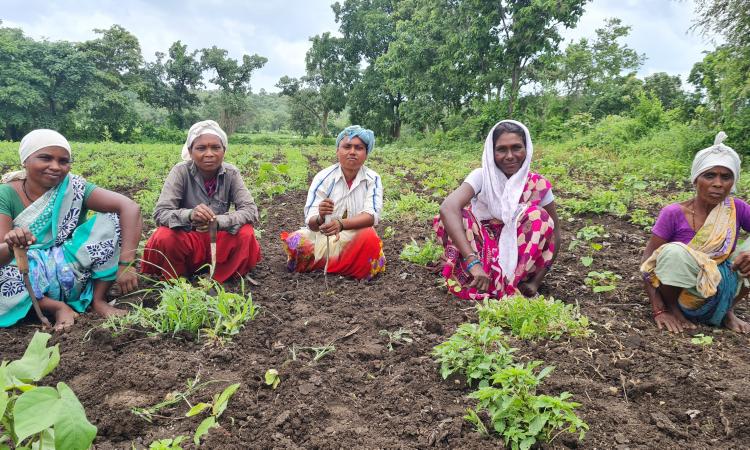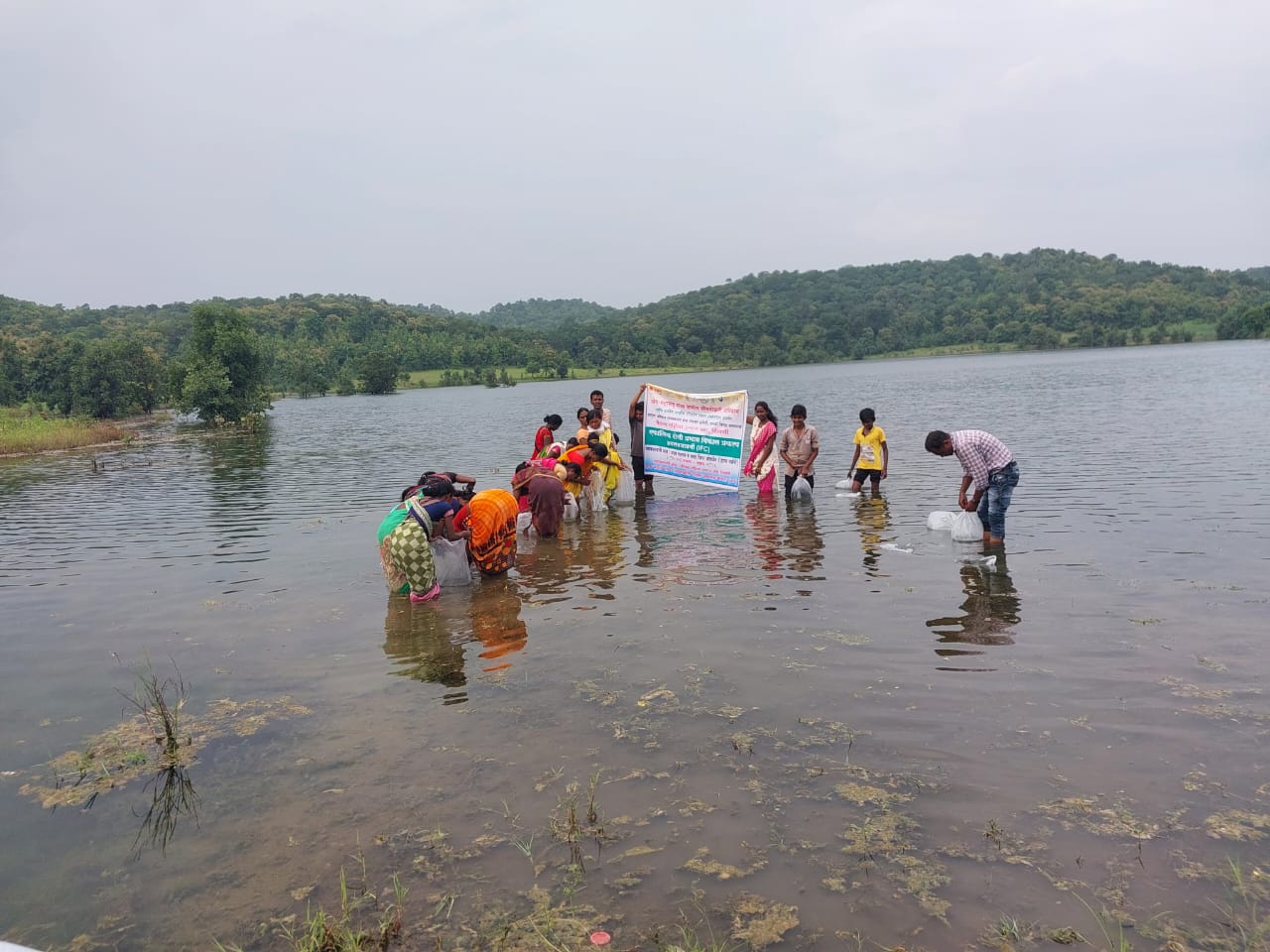
In 2018, when the communities of Ghatanji Block in Yavatmal attended a workshop about the Panchayat Extension to Scheduled Areas (PESA) Act, the information accessed brought about a shift in their perspective, where they felt empowered to reclaim common resources that rightfully belonged to them. Organised for and attended by around 150 women from 24 villages in Ghatanji, the workshop aimed to build a strong understanding of the PESA Act and its functioning amongst them.
The PESA Act confers special powers to traditional Gram Sabhas in Scheduled Areas primarily for the purpose of natural resource management, promoting self-governance and local stewardship. It mandates special provisions that empower tribal communities to make their own decisions on matters related to their village’s development.
For Savita Borkar and Sheela Borkar, the understanding of the PESA Act they gained at the workshop enabled them to recognise the socio-political realities of their village, Kopara. In addition to the communities’ right to govern, they learned that the Act gave Gram Sabhas the authority to manage the shared natural resources, or commons, located within the village area that falls under the Act’s jurisdiction.
A few months later, Savita, Sheela, and others from the Jeevanjyoti Mahila Gram Sangh, a women’s collective in the village that focuses on sustainable livelihoods, approached the FES team about their intention to reclaim and undertake pisciculture in the Kopara village pond. Despite being covered under PESA, the village’s pond had been contracted to an external party without the Gram Sabha’s consent. Since it was a percolation pond, the contractor pumped water into it when required and used it to cultivate fish. The Gram Panchayat, in turn, received a certain percentage of the profits that the contractor earned through the sale of the fish.
However, the women of Kopara recognised that this was a direct violation of the PESA Act. Though the decisions relating to the village’s development, in this case, the management of the pond, rested with the Gram Sabha, their customary rights over their resources were not being recognised. With the requisite guidance and support, the women believed they were capable of directly managing the pond and taking up pisciculture themselves.
"The main aim of the workshop was to build awareness of the PESA Act among the villagers, especially among the women in the communities. The eagerness with which the women of Kopara understood the nuances of the Act and pursued their rights to govern their shared resources was not an event we anticipated would happen immediately. Despite financial constraints, the women, both keen and determined, strongly believed that with proper guidance they would be able to shift the situation in the community’s favour," says Govind Anant Pednekar, Senior Project Manager, FES Team (Maharashtra).
The women’s collective raised their concerns with local authorities, but the conversation did not move forward as expected. Finally, with support and guidance from the FES team, they submitted a petition to Yavatmal’s District Collector. Since the village administration had followed the required contractual procedures, the Collector’s initial observations of the situation highlighted the absence of any irregularities. However, once the petitioners apprised him of Kopara’s PESA status and its existing scenario, the Collector passed an official order, emphasising the proper implementation of PESA provisions in the village.
While obtaining the Collector’s approval took about three to four months, the women’s collective simultaneously carried out a series of awareness programmes in the village to inform the larger community about the situation. They also approached the Maharashtra State Rural Livelihood Mission (MSRLM) functionaries and enrolled themselves in the pisciculture training programme provided under the mission. The FES team continued to guide them on the way forward while also liaising with concerned officials at MSRLM to ensure that the women receive fish seeds, in addition to the 3- to 4-day capacity-building programme.
With the village pond under community ownership and the women adequately trained to rear fish, everything was going well. However, the pond’s location in the neighbouring village of Kadki raised concerns about the safety of the fish among the womenfolk of Kopara. The Kopara Gram Sabha’s decision to station villagers and take turns patrolling the pond every night to address the women’s concerns didn’t go down too well with the Kadki community. Subsequently, the Kadki villagers protested their neighbours’ intervention in the pond. It took a series of meetings between the two village communities to diffuse the situation.
Eventually, the Kadki community recognised their neighbouring village’s customary rights over the water resource, as per the PESA provisions. However, since both communities depend on the same water resource, upon mutual understanding, interested households from Kadki were invited to actively participate in the Kopara community’s efforts to manage the pond.

Approved by the previous contractors who managed the pond, the utilisation of its water by a particular Kadki farmer posed another challenge. The Kopara women’s group was concerned that the continuous usage would impact the pond water levels, thereby causing harm to the fish reared in the pond. Despite their concerns, the Kopara community recognised that, in the absence of other water sources in the vicinity, the Kadki farmer’s water requirements for his lands were genuine. Though initially reluctant to participate in the dialogue, the farmer eventually relented. Acknowledging his desperate situation, the two village communities collectively made an exception. They allowed the farmer to access the pond water to address his farming needs as long as sufficient water levels for pisciculture were maintained in the pond.
Despite their relentless efforts, the women continued to face challenges. In addition to fish theft by outsiders and decreasing water levels, as it was a percolation pond, an average profit margin earned through the sales of the harvested fish forced the women to revisit their decision to rear fish. Though their sales profit may not have been as significant as expected, the persistence shown by these 40 women in reclaiming their governance rights over their village and their natural resources did not go in vain. Seeking appropriate implementation of the PESA Act’s provisions, their relentless efforts empowered the village community to be more assertive.
However, five years later, the women of the Jeevanjyoti Mahila Gram Sangh have proved that their persistence has not waned. In July 2023, with renewed vigour, the women decided to pursue pisciculture again in Kopara’s village pond. Working closely with a more empowered and informed community, the women rallied individuals of all age groups from the village to partake in the process actively, especially in rendering their service to protect the pond. This collective participation is helping the women prevent fish theft, a key challenge they faced earlier.
"Women are made to believe that they cannot run a business. The community didn’t think that we could undertake fish farming. However, with a better understanding of the rights and privileges governing our village, we decided to earn our recognition. Through our collective efforts, we have been able to reclaim our governance rights and prove to the larger community that women can contribute actively towards the village’s development," says Sheela Borkar, Jeevanjyoti Mahila Gram Sangh.
The Kopara village example indicates that raising awareness and regularly revisiting the provisions of existing legislation with the local communities is imperative. Empowering them with relevant knowledge to strengthen their agency will further strengthen their resolve to protect their lands with more zeal.
/articles/empowered-pesa-act-mahila-sangh-relentlessly-works-reclaim-governance